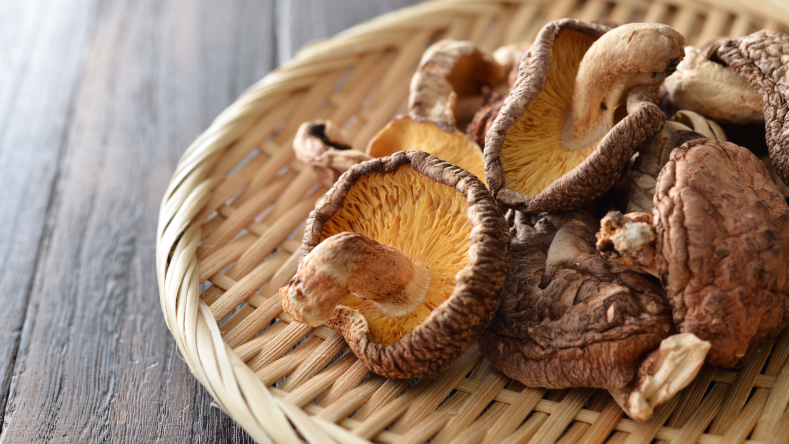What are medicinal mushrooms?
This question is about Nutrition
Medicinal mushrooms are fungi that offer powerful health benefits, such as improved cognition, better sleep quality, reduced inflammation and lowered LDL (“bad”) cholesterol
Here are some of the most common medicinal mushrooms:
Reishi. This type of mushroom has a compound called triterpene that has been found to improve sleep, reduce stress, alleviate anxiety, and ease depression [
1
,2
].Lion’s mane. Science suggests that lion’s mane may be beneficial for mental clarity, thanks to its positive impact on cognition, memory, and concentration [
3
,4
]Chaga. Chaga is packed full of antioxidants that can help with oxidative stress, inflammation, and lowering LDL cholesterol [
5
,6
]Shiitake. Research shows that shiitake mushrooms may offer major heart health benefits, as they can help lower LDL cholesterol, improve circulation, reduce inflammation, and prevent plaque buildup in the arteries [
7
].Turkey tail. Thanks to the compound polysaccharide-K (PSK), turkey tail mushrooms have a high antioxidant content, offer anti-cancer properties, and may improve the immune system of those receiving chemotherapy [
8
].Cordyceps. If you’re looking for an energy boost both in and out of the gym, then cordyceps may be a good option for you. Studies show that this mushroom can help enhance blood and oxygen flow, boost athletic performance, and improve post-workout recovery [
9
,10
].
You can enjoy medicinal mushrooms by adding them to tea, juice, smoothies, or your morning coffee.

People also ask:
References:
Venturella, G., Ferraro, V., Cirlincione, F., & Gargano, M. L. (2021). Medicinal Mushrooms: Bioactive Compounds, Use, and Clinical Trials. International journal of molecular sciences, 22(2), 634.
https://doi.org/10.3390/ijms22020634
Pazzi, F., Adsuar, J. C., Domínguez-Muñoz, F. J., García-Gordillo, M. A., Gusi, N., & Collado-Mateo, D. (2020). Ganoderma lucidum Effects on Mood and Health-Related Quality of Life in Women with Fibromyalgia. Healthcare (Basel, Switzerland), 8(4), 520.
https://doi.org/10.3390/healthcare8040520
�Mori, K., Inatomi, S., Ouchi, K., Azumi, Y., & Tuchida, T. (2009). Improving effects of the mushroom Yamabushitake (Hericium erinaceus) on mild cognitive impairment: a double-blind placebo-controlled clinical trial. Phytotherapy research : PTR, 23(3), 367–372.
https://doi.org/10.1002/ptr.2634
Sabaratnam, V., Kah-Hui, W., Naidu, M., & Rosie David, P. (2013). Neuronal health - can culinary and medicinal mushrooms help?. Journal of traditional and complementary medicine, 3(1), 62–68.
https://doi.org/10.4103/2225-4110.106549
Liang, L., Zhang, Z., Sun, W., & Wang, Y. (2009). Effect of the inonotus obliquus polysaccharides on blood lipid metabolism and oxidative stress of rats fed high-fat diet in vivo. 2009 2nd International Conference on Biomedical Engineering and Informatics.
https://doi.org/10.1109/bmei.2009.5305591
Kim Y. R. (2005). Immunomodulatory Activity of the Water Extract from Medicinal Mushroom Inonotus obliquus. Mycobiology, 33(3), 158–162.
https://pubmed.ncbi.nlm.nih.gov/24049493/
Dai, X., Stanilka, J. M., Rowe, C. A., Esteves, E. A., Nieves, C., Jr, Spaiser, S. J., Christman, M. C., Langkamp-Henken, B., & Percival, S. S. (2015). Consuming Lentinula edodes (Shiitake) Mushrooms Daily Improves Human Immunity: A Randomized Dietary Intervention in Healthy Young Adults. Journal of the American College of Nutrition, 34(6), 478–487.
https://doi.org/10.1080/07315724.2014.950391
Krestin. Krestin - an overview | ScienceDirect Topics. (n.d.). Retrieved March 31, 2022, from
https://www.sciencedirect.com/topics/medicine-and-dentistry/krestin
Tuli, H. S., Sandhu, S. S., & Sharma, A. K. (2014). Pharmacological and therapeutic potential of Cordyceps with special reference to Cordycepin. 3 Biotech, 4(1), 1–12.
https://doi.org/10.1007/s13205-013-0121-9
Chen, C. Y., Hou, C. W., Bernard, J. R., Chen, C. C., Hung, T. C., Cheng, L. L., Liao, Y. H., & Kuo, C. H. (2014). Rhodiola crenulata- and Cordyceps sinensis-based supplement boosts aerobic exercise performance after short-term high altitude training. High altitude medicine & biology, 15(3), 371–379.
https://doi.org/10.1089/ham.2013.1114
